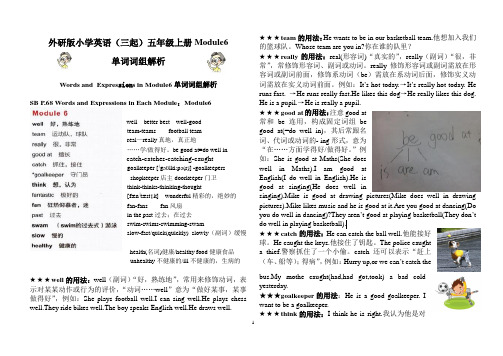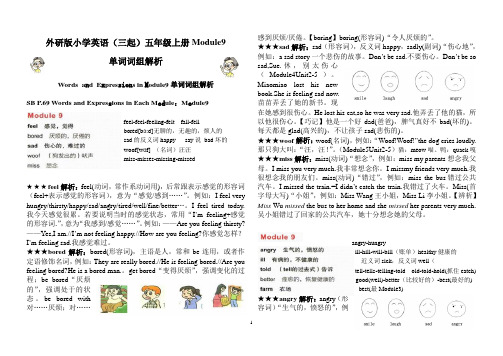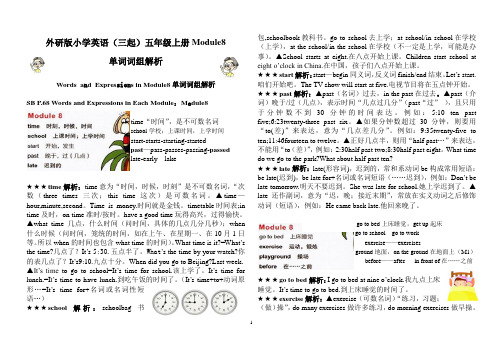英语词组解析
外研版小学英语(三起)五年级上册Module6单词词组解析

外研版小学英语(三起)五年级上册Module6单词词组解析Words and Expres sion s in Module6单词词组解析SB P.68 Words and Expressions in Each Module :Module6well better best well-goodteam-teams football team real —really 真地,真正地……学/做得好。
be good at=do well incatch-catches-catching-caughtgoalkeeper [ˈg əʊlki:p ə(r)] -goalkeepers shopkeeper 店主doorkeeper 门卫think-thinks-thinking-thought[fæn ˈtæst ɪk] wonderful 精彩的,绝妙的 fan-fans fan 风扇 in the past 过去;在过去 swim-swims-swimming-swamslow-fast/quick(quickly) slowly (副词)缓慢地health(名词)健康/healthy food 健康食品 unhealthy 不健康的/ill 不健康的,生病的★★★well 的用法:well (副词)“好,熟练地”,常用来修饰动词,表示对某某动作或行为的评价,“动词……well ”意为“做好某事,某事做得好”,例如:She plays football well.I can sing well.He plays chess well.They ride bikes well.The boy speaks English well.He draws well.★★★team 的用法:He wants to be in our basketball team.他想加入我们的篮球队。
Whose team are you in?你在谁的队里? ★★★really 的用法:real(形容词)“真实的”,really (副词)“很,非常”,常修饰形容词、副词或动词。
外研版小学英语(三起)五年级上册Module9单词词组解析

外研版小学英语(三起)五年级上册Module9单词词组解析Words a n d E x pres sion s in M odule9单词词组解析SB P.69 Words and Expres s ions in Each M od ule :M o dule9feel-feel-feeling-felt fall-fellbored[b ɔ:d]无聊的,无趣的,烦人的 sad 的反义词happy say 说 bad 坏的 woof[w ʊf] (名词)汪汪miss-misses-missing-missed★★★feel 解析:feel(动词,常作系动词用),后常跟表示感觉的形容词(feel+表示感觉的形容词),意为“感觉/感到……”。
例如:I feel very hungry/thirsty/happy/sad/angry/tired/well/fine/better …。
I feel tired today.我今天感觉很累。
若要说明当时的感觉状态,常用“I ’m feeling+感觉的形容词.”,意为“我感到/感觉……”。
例如:——Are you feeling thirsty?——Yes,I am.//I ’m not feeling happy.//How are you feeling?你感觉怎样?I ’m feeling sad.我感觉难过。
★★★bored 解析:bored(形容词),主语是人,常和be 连用,或者作定语修饰名词,例如:They are really bored.//He is feeling bored.//Are you feeling bored?He is a bored man.。
get bored “变得厌烦”,强调变化的过程;be bored “厌烦的”,强调处于的状态。
be bored with 对……厌烦;对……感到厌烦/厌倦。
【boring 】boring(形容词)“令人厌烦的”。
高中英语重点词汇、词组辨析(非常好)

高中英语重点词汇、词组辨析1.above all, after all, at all, in allabove all表示“最重要,首先”,常置于句首或句中,作插入语,起强调作用。
Above all, we have won the game.after all表示“毕竟,终究,终归,到底”,在句中位置较灵活。
Jessica has turned out to be a nice girl after all.at all表示“根本”。
I don’t like Mexican food at all.in all表示“总共”,既可放在句首,也可放在句末。
We have learned 2500 English words in all.2. accept, receiveaccept表示“接受”的意思,是有意识的。
I’ve received a gift from him, but I’m not going to accept it. receive表示“收到”的意思,是无意识的。
Did you receive any letters today?3. add, add to, add...to, add up toadd表示“增加,添加,计算……总和,补充说”。
If the water is too cold, add some more hot water.add to表示“增添,增加,增进”。
The heavy snow added to our difficulties.add...to表示“把……加到……”。
Add ten to forty, and you will get fifty.add up to表示“合计达到”,该短语不用于被动语态。
All his school education added up to no more than one year.4. admit sb./sth. to..., admit of, admit toadmit sb./sth. to表示“……允许某人或某物进入某处”。
高二英语词组短语试题答案及解析

高二英语词组短语试题答案及解析1. What annoys me most is that every time I ________, he seems to be checking up on me. A.turn away B.turn around C.turn in D.turn out【答案】B【解析】考查动词短语辨析。
句意:最使我苦恼的是,每次我回头看时,他都好像是在监视着我。
A转身离开,拒绝进入;B转向,好转;C上床睡觉,上交,检举;D结果是,证明是。
这里是“转向,转身”的意思,故选B。
【考点】考查动词短语辨析2. The challenge Lenovo faces is to develop a global brand that will ________a broader consumer group.A.refer to B.appeal to C.relate to D.attach to【答案】B【解析】动词短语辨析。
句意:联想面临的挑战是研发一个适合更大范围的消费群体的全球品牌。
A提到,指的是,参考;B呼吁,适合,上诉;C与......有关;D贴上,附上。
根据句意可知,这里是“适合,迎合”的意思,故选B。
【考点】考查动词短语辨析3. His success ________ his hard work.A.resulted in B.resulted from C.resulted of D.led to【答案】B【解析】试题分析:句意:他的成功来自他的努力工作。
result in导致;result from由……引起;lead to导致,造成。
根据句意可知答案选B。
【考点】考查动词短语辨析。
4. ---What makes you decide to buy a new house in the town? ---This town is _______ pollution.A.far from B.apart from C.free from D.away from【答案】C【解析】句意:---什么使你决定在镇上买了一幢新房子?---这座城市没有污染。
高中英语常用单词词组的用法总结及例句

英语常用单词词组的用法总结及例句tell的用法总结及例句tell表示“告诉”,可接双宾语,双宾语易位时用介词to引出间接宾语,还可接不定式的复合结构作宾语。
1 tell的词义解析vt. 告诉,说,辨别,吩咐,讲述vt.& vi. 分辨,辨别,告诉,吩咐,泄漏,保证vi. 泄密,告发,(颜色、声音等)显示,识别n. [考古学](古代村落遗址堆积而成的)台形土墩,[方言]讲的话,谈话,传闻变形:过去式: told; 现在分词:telling; 过去分词:told;2 tell的基本用法1、tell做动词,意为“告诉,告知”其后可接双宾语或宾语从句。
也可以接动词不定式作宾补。
例句:Please tell me your telephone number.请告诉我你的电话号码。
You can tell him to stay at home.你可以告诉他呆在家里。
2、tell做不及物动词,意为讲诉。
例句:I can't tell.我说不出来。
3、tell做名词,意为“话,传说”。
例句:I have a tell for you.我有话跟你说。
3 tell相关短语及例句1、tell about(v.+prep.) 告诉有关…的情况tell about sb/sth例句:She told about Linda, who was very kind to her.她谈了谈林达的情况,林达对她非常好。
He told about his plans.他谈到他的计划。
2、tell against(v.+prep.) 证实对…不利tell against sb/sth例句:In an investigation, a new fact became known, which told against him.在调查中新发现了一件对他不利的事实。
Her poor eyesight is bound to tell against her applying for a job.她视力不好,必然不利于她找工作。
外研版小学英语(三起)五年级上册Module8单词词组解析

外研版小学英语(三起)五年级上册Module8单词词组解析Words a n d Expres sion s in Module8单词词组解析SB P.68 Words and Expressions in Each Module :M o dule8time “时间”,是不可数名词 school 学校;上课时间,上学时间 start-starts-starting-startedpast —pass-passes-passing-passed late-early lake★★★time 解析:time 意为“时间,时候,时刻”是不可数名词,“次数(three times 三次;this time 这次)是可数名词。
▲time —hour,minute,second 。
Time is money.时间就是金钱。
timetable 时间表;in time 及时,on time 准时/按时。
have a good time 玩得高兴,过得愉快。
▲what time 几点,什么时间(问时间,具体的几点几分几秒);when 什么时候(问时间,笼统的时间,如在上午、在星期一、在10月1日等。
所以when 的时间也包含what time 的时间)。
What time is it?=What ’s the time?几点了?It ’s 5:30.五点半了。
What ’s the time by your watch?你的表几点了?It ’s9:10.九点十分。
When did you go to Beijing?Last week .▲It’s time to go to school=It ’s time for school.该上学了。
It ’s time for lunch.=I t’s time to have lunch.到吃午饭的时间了。
(It ’s time+to+动词原形…=It ’s time for+名词或名词性短语…)★★★school 解析:schoolbag 书包,schoolbook 教科书。
高中人教版英语重点词组单选题100道及答案解析
高中人教版英语重点词组单选题100道及答案解析1. The doctor is skilled at treating heart trouble and never accepts any gift from his patients, so he has a very good ______.A. expectationB. reputationC. contributionD. civilization答案:B解析:reputation 意为“名声;声誉”。
句意:这位医生擅长治疗心脏病,并且从不接受病人的任何礼物,所以他有很好的声誉。
expectation 意为“期望”;contribution 意为“贡献”;civilization 意为“文明”,均不符合句意。
2. We should keep ______ in the reading room.A. quietB. quietlyC. quiteD. quickly答案:A解析:keep quiet 为固定短语,意为“保持安静”。
quiet 是形容词,作系动词keep 的表语。
3. The little girl was ______ by the big dog and cried.A. frightenedB. frighteningC. frightenD. to frighten答案:A解析:frightened 意为“感到害怕的”,常用来修饰人;frightening 意为“令人害怕的”,常用来修饰物。
此处是小女孩被大狗吓到了,用frightened。
4. The teacher came into the classroom ______ a book in his hand.A. withB. forC. onD. by答案:A解析:with + 名词+ 介词短语,表示“带着……”。
5. It's very kind ______ you to help me.A. forB. ofC. toD. on答案:B解析:It's + adj. + of sb. to do sth. 表示“某人做某事是……的”,此处形容词kind 是形容人的品质。
解释英语词组
解释英语词组前言英语是世界常用的语言之一,是国际交流必备的语言之一。
在英语学习中,学习词汇是非常重要的一步,而词组也是其中不可或缺的一部分。
所谓词组,就是通常由两个或更多的单词组成的固定短语。
理解和掌握常用的英语词组不仅可以提高口语表达能力,也有助于阅读和听力能力的提高。
1.常见英语词组以下为常见英语词组,了解这些词组对于掌握英语表达很有帮助。
(1)at first sight——乍一看(2)once in a while——偶尔(3)in the long run——长远来看(4)give up——放弃(5)make up one's mind——下决心(6)turn down——拒绝(7)carry on——继续(8)go over——仔细检查(9)in the meantime——在此期间(10)as a matter of fact——事实上(11)in the end——最终(12)in spite of——尽管(13)take over——接管(14)by the way——顺便说一下(15)keep up with——跟上2.解释英语词组(1)at first sight——乍一看这个词组常常用来描述一种第一眼的感觉,也可用于形容事物外表的表象。
例如:At first sight, I thought he was kind andgentle.(乍一看,我认为他很友善、温和。
)(2)once in a while——偶尔这个词组意思是“有时候,偶尔”。
例如:I like to have a cup of coffee once in a while.(我偶尔喜欢喝一杯咖啡。
)(3)in the long run——长远来看这个词组表示长期的影响,一般表示在一段时间后或长时间来看的结果。
例如:In the long run, hard work always pays off.(长期来看,努力总会有回报。
英语重点词、词组、短语辨析
1. in a moment, at the moment, at any moment, for the moment, for a moment, the moment…in a moment表示“过一会儿”,常用在将来时中。
如:I will be back in a moment. 我过一会儿就回来。
at the moment表示“目前”,相当于at present如:I am very busy at the moment. 我现在很忙。
at any moment表示“随时”。
如:He can be here at any moment. 他随时都有可能来。
for the moment表示“暂时”。
I don’t want to change my job for the moment. 我暂时还不想换工作。
for a moment的意思是“一会儿”,表示动作的持续。
He said that he would be away for a moment.the moment可以引导一个时间状语从句,翻译成“一……就……”。
如:She cried the moment she saw him.5. in charge of, in the charge ofin charge of的意思是“负责;掌管”。
如:Mr. Smith is in charge of the whole company.in the charge of是“由……负责”。
The shop will be in the charge of Mike until the manager comes back.。
6. in the past, in the past few yearsin the past的意思是“在过去”,与过去时搭配。
In the past, there was only one school in this area.in the past few years的意思是“在过去的几年中”,与现在完成时搭配。
词组大全英语
词组大全英语英语词组大全一、名词词组1. 名词词组的基本结构名词词组是由一个或多个名词通过添加适当的修饰语组成。
例如:apple(苹果),red apple(红苹果),a red apple(一个红苹果)。
2. 名词所有格名词所有格表示某物的归属,通过在名词后面加's或'构成。
例如:John's book(约翰的书)。
二、动词词组1. 动词词组的基本结构动词词组是由一个或多个动词通过添加适当的助动词、情态动词或时态动词组成。
例如:go to school(去上学),want to go(想要去)。
2. 动词短语动词短语是指由一个或多个动词与其他词语一起组成的固定搭配。
例如:look for(寻找),come from(来自)。
三、形容词词组1. 形容词词组的基本结构形容词词组是由一个或多个形容词通过添加适当的修饰语组成。
例如:beautiful flowers(美丽的花朵),the most beautiful flower(最美丽的花朵)。
2. 形容词的比较级和最高级形容词的比较级和最高级是通过添加适当的比较级或最高级词尾-er、-est 构成的。
例如:happier(更快乐),happiest(最快乐)。
四、副词词组1. 副词词组的基本结构副词词组是由一个或多个副词通过添加适当的修饰语组成。
例如:quickly (快速地),the most quickly(最快地)。
2. 副词的比较级和最高级副词的比较级和最高级是通过添加适当的比较级或最高级词尾-lier、-liest构成的。
例如:closest(最近),closest of all(最最近)。
五、介词词组1. 介词词组的基本结构介词词组是由一个或多个介词通过添加适当的修饰语组成。
例如:in the morning(在早上),during the day(在白天)。
2. 介词的固定搭配介词与其他词语之间存在许多固定搭配,这些搭配通常是固定的,不能随意更改。
- 1、下载文档前请自行甄别文档内容的完整性,平台不提供额外的编辑、内容补充、找答案等附加服务。
- 2、"仅部分预览"的文档,不可在线预览部分如存在完整性等问题,可反馈申请退款(可完整预览的文档不适用该条件!)。
- 3、如文档侵犯您的权益,请联系客服反馈,我们会尽快为您处理(人工客服工作时间:9:00-18:30)。
for example 和such as 的区别 这两个短语都可以作"例如"解。
(1) for example用来举例说明某一论点或情况,一般只举同类人或物中的"一个"为例,作插入语,可位于句首、句中或句末。例如:
Ball games, for example, have spread around the world. 例如,球类运动已经在世界各地传播开了。
What would you do if you met a wild animal - a lion, for example? 如果遇上野兽,例如狮子,你该怎么办?
(2) such as用来列举事物时,一般列举同类人或事物中的几个例子。插在被列举的事物与前面的名词之间,as后面不可有逗号。例如:
Some of the rubbish, such as food, paper and iron, rots away over a long period of time. 有些废物,如剩饭、废纸和废铁,时间一久就烂掉了。
for example就把他当成是插入语,句子结构不回受到这个插入语的影响,而such as可你把他理解成一个介词的作用,介词后面接名词,动名词。
for example 只可以举一个例子,且不可与etc连用,而such as常用来列举同类人或同类事物的几个为例,但不是全部,其后不加逗号.举个例子 1.Tom ,for example ,is my good friend. 2.I have some good friends,such as Tom ,Kate,wangbin.
比较so和 such 其规律由so与such的不同词性决定。such 是形容词,修饰名词或名词词组,so是副词,只能修饰形容词或副词。so 还可与表示数量的形容词many,few,much, little连用,形成固定搭配。
so + adj. such + a(n) + n. so + adj. + a(n) + n. such + n. (pl.) so + adj. + n. (pl.) such +n. (pl.) so + adj. + n. [不可数] such +n. [不可数] so foolish such a fool so nice a flower such a nice flower so many/ few flowers such nice flowers so much/little money. such rapid progress so many people such a lot of people so many 已成固定搭配,a lot of 虽相当于 many,但 a lot of 为名词性的,只能用such搭配。
so„that与such„that之间的转换既为 so与such之间的转换。 agree 的各种用法 agree一般与with连用,agree with sb.,表示同意某人的观点 agree vt. & vi. 基本用法如下
1)单独使用,表示同意、答应等。如: ①I asked him to help me and he agreed. 我请求他帮忙,他答应了。 ②After a short time, the program was agreed. 过了一会儿,这项计划大家都同意了。 2)跟介词with连用. 表示"同意;赞成";"与……一致;(气候,食物)适合"。 例如:①I quite agree with what you said. 我很同意你说的话。 ②I don"t quite agree with their methods(opinions, ideas). 我不太赞成他们的办法(意见,想法)。 ③The verb must agree with the subject in person and number. 动词在人称和数上应与主语一致。 ④The enemy generals could not agree with one another; they quarrelled the whole night. 敌军将领意见不一致,争吵了一整夜。 3)跟介同to连用,表示"同意;赞成(提议、安排、计划等)"。例如: ①I agree to the proposal(the plan). 我同意这个提议(计划)。 ②Do you agree to this arrangement?你赞成这个安排吗? ③I quite agree to their suggestions. 我很同意他们的建议。 4)与介词on连用,表示"对……取得一致意见"(主语往往是协商一件事的人们或单位,后面常接表示具体协议的文件、计划、行动等名词)。例如:
①The date for the next meeting was agreed on. 下次会议的日期达成了一致的协议。 ②They agreed on going there the following day. 他们一致同意第二天到那里去。 5)跟不定式作宾语,表示"同意做某事"。例如: ①He agreed to get someone to help us. 他同意找人来帮我们的忙。 ②She agreed to get everything ready before I come. 她同意在我到来之前把一切都准备好。 6)跟从句,表示"一致认为、同意"。例如: ①Most scientists agreed that computers cannot completely take the place of human beings. 大多数科学家一致认为,计算机不能完全代替人。
②At last, the boss agreed that I should do the work. 最后,老板同意我来做这项工作。
5)跟不定式作宾语,表示"同意做某事"。例如: ①He agreed to get someone to help us. 他同意找人来帮我们的忙。 ②She agreed to get everything ready before I come. 她同意在我到来之前把一切都准备好。 6)跟从句,表示"一致认为、同意"。例如: ①Most scientists agreed that computers cannot completely take the place of human beings. 大多数科学家一致认为,计算机不能完全代替人。
②At last, the boss agreed that I should do the work. 最后,老板同意我来做这项工作。
So do I 与 So I do 一、So do I的用法 该结构主要用来说明前面所说的情况也同样适用于后面的人或物,意为“„„也一样”。该结构中的助动词 do 根据前文的情况也可换成 is, am, are, was, were, does, did, can, could 等。如: He passed the exam, and so did I. 他通过了考试,我也通过了考试。 又如: They went to the zoo yesterday. So did we. 他们昨天去了动物园,我们也去了。 但是如果前面所述情况为否定式,则用neither, nor引出倒装句(此时不能用so)。如: He couldn’t do it, and neither could she. 他做不了这事,她也做不了。 He never comes late. Nor do I. 他从不迟到,我也从不迟到。 二、So I do的用法 该结构主要用于加强语气,其意为“的确如此、确实如此”,表示后者赞同前者的话或意见,只是进一步强调并重复前句所述的内容。前后句的主语指的是同一个人或物。该结构中的助动词 do 根据前文的情况也可换成 is, am, are, was, were, does, did, can, could 等。如: —He has done a good job. 他干得不错。 —So he has. 他的确干得不错。 —He will speak at the meeting tomorrow. 他明天将在会上发言。 —So he will. 确实如此。 —He went to see his friend yesterday. 他昨天去看朋友了。 —So he did. 的确如此。 a number of 和a great deal of a number of 和a great deal of 在意思上相同,但用法不一样。a number of 后面只能跟可数名词的复数形式,而a great deal of 后面只能跟不可数名词。 例如:A number of accidents always occur on rainy days.雨天常常有许多事故发生。 A number of books are missing from the library.图书馆的一些书不见了。 I spent a great deal of my time on this work.我在这项工作上花了不少时间。 另外,a great deal of 也可说成a good deal of。 例如:She spends a good deal of money on clothes every year. 她每年在衣服上花了不少钱。 除了 a number of 之外,也可以用a large/good number of 或(large) numbers of 来表示数量众多,意思为“大量的,众多的” 例如:Numbers of people came from all parts of the country to see the exhibition. 许多人从国内来参观这个展览。 需要引起注意的是,若用the number of ,后面仍需用名词复数,但谓语动词则应用单数。因为这时表示的是数字,而非数量。 例如:The number of books missing from the library is very large. 图书馆遗失的图书数量很大。
in case/in the case/in case of的用法及区别 in case万一。是连词,引导条件状语从句。也就是说in case后面是一个完整的句子 Take a hat with you in case the sun is very hot. 倘若太阳很利害,你就把帽子戴上。 in case of的of是介词,介词后面只能带名词性质的词,比如名词、代词等。意思和in case差不多,万一的意思 In case of rain they can't go. 万一下雨,他们就不能去了。 in the case of,就...来说, 关于。意思跟上面两个不一样了。一般表示转而提及另一件事情。比如 In the case of woman,they have more difficulty in their job。就女性来说,她们在工作中会遇到更多的困难
